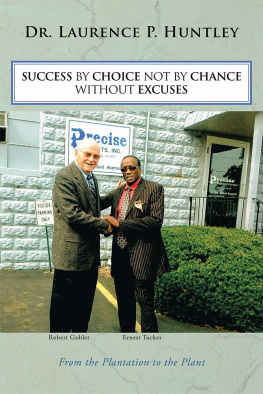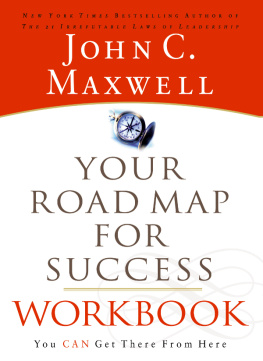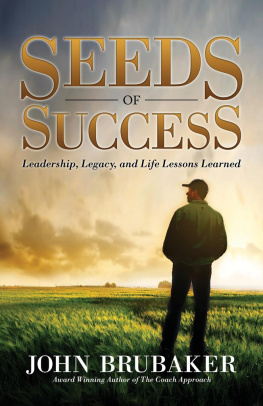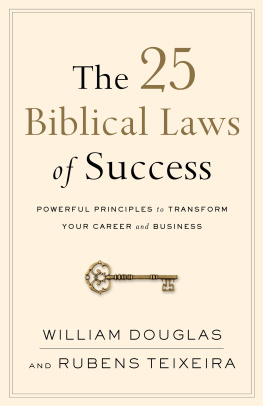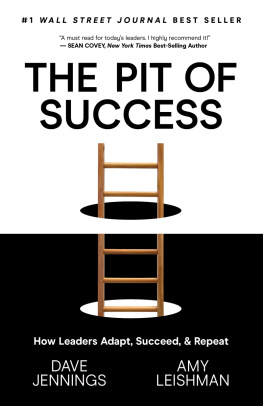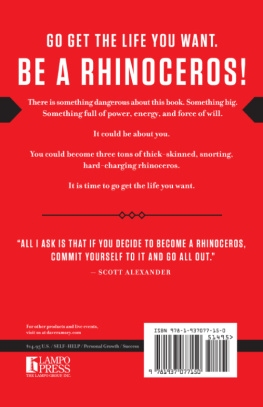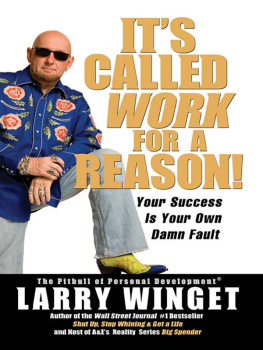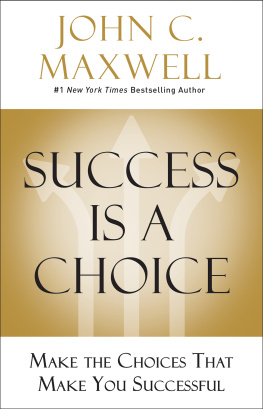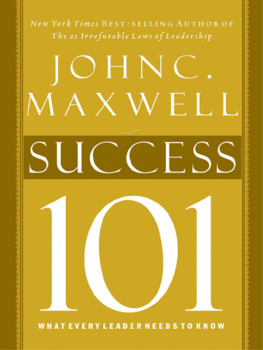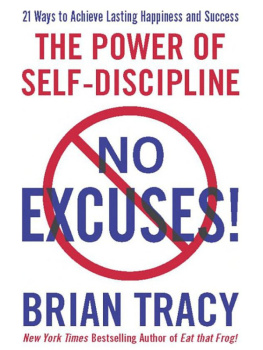DR. LAURENCE P. HUNTLEY
SUCCESS BY CHOICE NOT BY CHANCE
WITHOUT EXCUSES
From the Plantation to the Plant

AuthorHouse LLC
1663 Liberty Drive
Bloomington, IN 47403
www.authorhouse.com
Phone: 1-800-839-8640
2013 by Dr. Laurence P. Huntley. All rights reserved.
No part of this book may be reproduced, stored in a retrieval system, or transmitted by any means without the written permission of the author.
Published by AuthorHouse 12/13/2013
ISBN: 978-1-4918-2447-4 (sc)
ISBN: 978-1-4918-2448-1 (hc)
ISBN: 978-1-4918-2446-7 (e)
Library of Congress Control Number: 2013918046
Any people depicted in stock imagery provided by Thinkstock are models, and such images are being used for illustrative purposes only.
Certain stock imagery Thinkstock.
Because of the dynamic nature of the Internet, any web addresses or links contained in this book may have changed since publication and may no longer be valid. The views expressed in this work are solely those of the author and do not necessarily reflect the views of the publisher, and the publisher hereby disclaims any responsibility for them.
All scripture quotations marked (KJV) are taken from the Holy Bible, King James Version. Copyright 1982 by Thomas Nelson, Inc.
CONTENTS
I n life we usually find a cause to justify the reality of our success or failure. We relate the outcomes to prior circumstances or experiences to justify our condition. Our ultimate rewards are intrinsically tied to our due diligence or lack there of. We are the product of our past etched in the capacity of our being.
The past is history, but the future is yet to come. If we project our thoughts on what we hope for, our vision will be created according to our hearts desires, not the dictates of our circumstance. We can have success by choice and not by chance by simply knowing exactly what we want and going after it. It is up to you.
The paradigm shows the simplicity of success. It is based on the do and donts of progressive thinking. To succeed you must have a desire to succeed, and then define what you would consider to be success. But you can only determine what success is if you have seen what success looks like in your vision of life.
First you must know that success is not a destination but an ongoing journey. Success comes from finding and fulfilling the needs of others. Someone once said, All good things come through the doors of men. When you plan your success, it must be based on fulfilling the needs of people first. In order to meet their needs, one must know their desires. A sense of empathy must exist in the mind of the success believer. They must know and understand how it feels to find a solution and the joy it brings to the one who seeks it.
If you want success, you must recognize your goal in life. Then decide how to attain that goal. Then find a vehicle to transport you into your desired world of success. What do you have to give, so that you could get there? Remember that you can only give that which you have. Giving is the pleasure of sharing the knowledge of having. Whatever is your gift, you must find it. Your gift is that which you will share with those who need your services. But the focus is not on the success, but on the service which brings success. It does not matter what you do, so long as you know that success is parallel to the size and scope to which you desire to help others, and the extent to which you will extend your gifts in meeting their needs, whether you are a painter, a poet, a planner or a plumber.
Desire is the first law of gains, and here in lies the power for change, and how it has transformed the lives of one generation from the plantation to the plant with no excuses. Ernies success is by choice, not by chance. His testament creates hope. Your encounter with him in this book will forever change your life, because it deals with adversity and recovery coupled with the power to believe.
Ernie was born into an unusual circumstance, nurtured in a harsh environment, grew up with the quality of a rose, beautiful in his character, his ways and his radiance, but protected by the thorns of the desire for survival. His premiere and most distinguished quality is his heart of gratitude. He maintained the qualities of a God given purpose true to his objective. His youthful life was harsh but it sharpened his sense of compassion which was instilled by the loving and guiding nature of his mother, the confidence building of his grandfather, and his innate character for fairness with a determination to do his part. Although he recalls the day the bus driver drove pass him on a lonely road a mile from school, it did not affect his attitude. He maintained his composure to listen and learned that in the end, the victory was his. He learned that day it is better to depend on God not man, and that everything in life is a lesson to be learnt.
Should he be given a challenge of a chance, he could change things. He carefully picked his fights so that he could win his battles, never with the person, but with that which stood in his way to success. To him the discovery of ignorance gave birth to the opportunity for him to seek the doorway to knowledge and a bright future. He strived to be a winner by choice, not by chance. Whatever he did he pursued with diligence wanting to be the best regardless of whom or what he competed against. As a boy he foot raced, jumped farm rails, chased away invaders, took risks, and endured pain to be counted in. His mantra was, No Excuses.
He worked harder and faster than most adults when he picked cotton or planted potatoes. He gained their respect and admiration, sometimes the envy of his peers. At the age of awareness, he was prepared to challenge the burdensome system of racial bigotry in his community, but the wit and wisdom of his mother prevailed when she realized that he was a very unique young man, who did not back down to adversity, and in his youthful way, would have settled the score in somewhat of an uncompromising manner with an irreversible outcome.
He was someone who was never intimidated by height or might. Although at times when he was right, he would have side stepped an issue if it would have compromised his opportunities to fulfill his greater objective. He would have changed the circumstances if he could, and left the rest to God. Sometimes his mother felt that he was cutting it too close, as in the instance with Mr. Tom in Mississippi. Before things could escalate to an irrevocable circumstance, she sent him to Chicago where his elder brother resided. His challenges were not as harsh, but there was opportunity if you sought after it. Ernie created his own breakthroughs, as he chose his turf, and calculated his mission. He had a great sense of discipline and determination with a terrific sense of priorities. He was steel willed and determined even though he maintained a sense of mental flexibility. He was inclined to carve out his own opportunities by examining all the options. Humble but confident, he focused on gaining knowledge since he recognized it to be the source of power and the vehicle to his goal in life. His three Ds in life were:
Dedication, Determination and Discipline. These principles were the foundation of his philosophy of life. When he picked a goal he always stuck to it. He never allowed distractions to get in his way. Despite the most adverse circumstances he never gave up. And when he approached a mission he followed an unshakable routine to achieve his goal. The rewards were always bountiful.
THE PURPOSE FOR THE BOOK
D uring a moment of reflection with Dr. Huntley, a colleague who was on the Advisory Council on African American Affairs of the Human Relations Commission for the City of Chicago, a question was raised. What have we tried to accomplish through the commission in the last decade? We looked at each other and laughed. He evaded the question and did what he always did, address the practical. Personally, Mr. Tucker said, I have tried and accomplished the things I have personally attempted to do with my children, and they have done the same or better with my grandchildren. What he decided to do was to leave the future generation a legacy on some basic principles of life that has guided my whole life. These principles have been what had anchored my steps and clarified my purpose. They have helped me to fulfill my objective of providing the best for my family. He hoped to leave just a foot print on the sands of time by recording his lifes journey. That was the nucleus of the idea which gave birth to him suggesting that a book be written about the on going saga of a blessed life.
Next page
